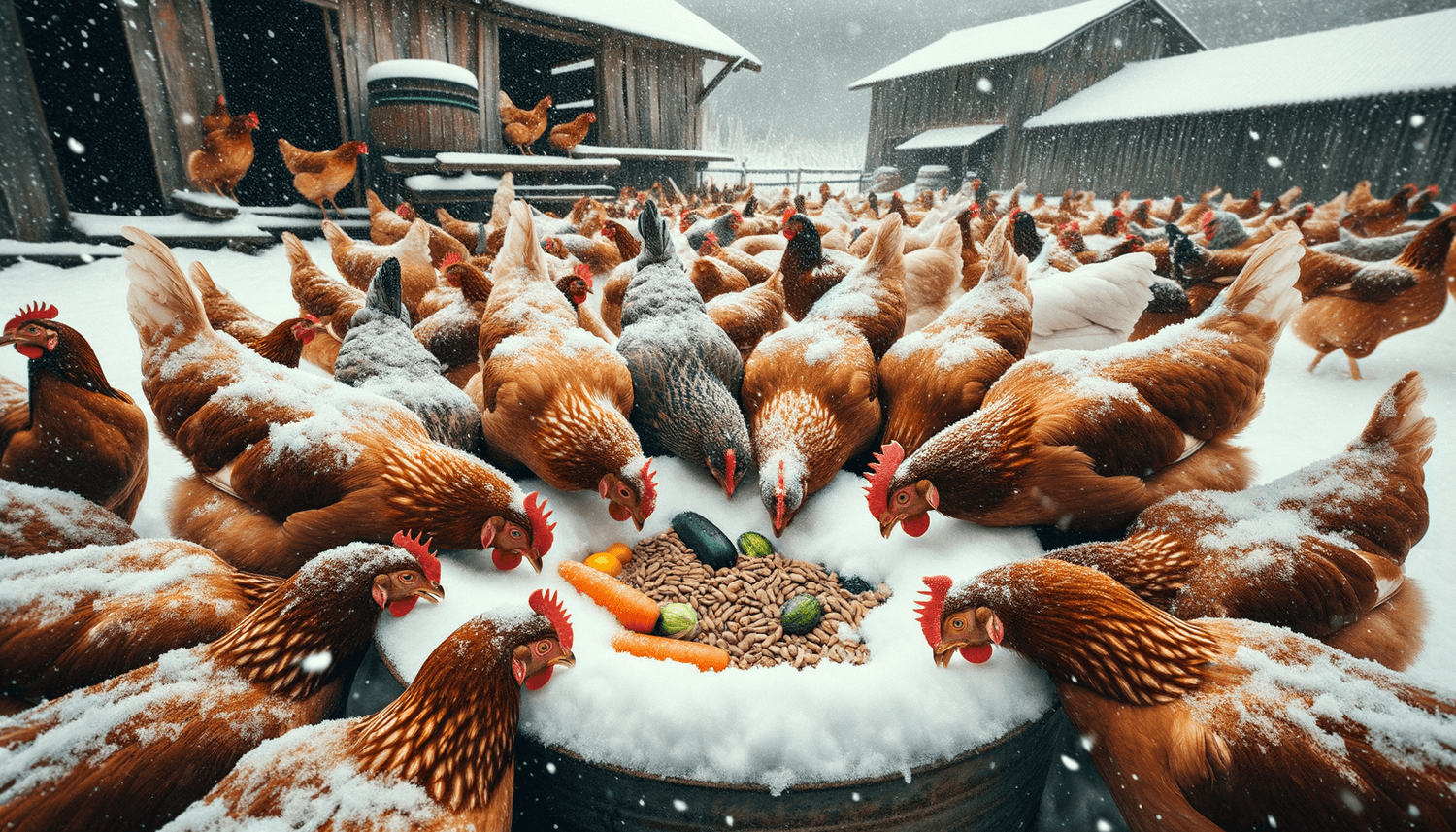Winter weather can bring a flurry of questions to the minds of backyard chicken enthusiasts, like “Can the ladies take a break from pecking and clucking to build a snowman?”, or more practically, “Can chickens eat snow for water?”. Bundle up and get ready to chip away at this chilly conundrum as we snowball through topics like the nutritional value of snow, the importance of maintaining a balanced diet, and the dos and don’ts of turning Jack Frost’s flaky handiwork into H2O for our feathered friends. Let’s scratch into the frozen earth and crack open the ice on this poultry paradox!
Can chickens eat snow for water?
Yes, chickens can technically eat snow for water, but it’s not the safest or most efficient way for them to stay hydrated. Consuming large amounts of snow could lower their body temperature, leading to increased energy expenditure and, in some cases, hypothermia. Therefore, providing unfrozen water sources for your chickens remains the best way to ensure their hydration and overall wellbeing.
A balanced diet: not just for humans
Just like humans, chickens need a balanced diet to lead healthy, happy lives. Ensuring they receive the proper nutrients helps promote better egg production, healthier feathers, and overall wellbeing. A chicken’s diet should primarily consist of a high-quality chicken feed, which should make up around 80-90% of their diet. This specially formulated feed is designed to provide all the essential vitamins, minerals, and calories needed for them to thrive.
Of course, chickens also enjoy treats! The remaining 10-20% of their diet can consist of a delicious array of fruits and vegetables. Not only do these tasty morsels encourage natural foraging behaviors, but they also bestow additional nutrients that complement their chicken feed. By providing a diverse diet, you help keep your chickens engaged and satisfied, while ensuring they receive the key components needed for a balanced diet.
Nutritional value of snow for water for chickens.
Although snow is comprised of water, it does not hold significant nutritional value for chickens. The primary purpose of water is to hydrate the chickens and support basic biological functions, rather than providing vital nutrients in the form of vitamins or minerals. Drinking water is essential to chickens’ digestion, nutrient absorption, and temperature regulation, so hydration plays a crucial role in their daily life.
Regarding snow as a source of hydration, it is less efficient and less safe for chickens than providing them with an unfrozen water source. When chickens consume snow, they need to expend body heat to melt it, which means they use more energy and may experience a drop in their core temperature. In extreme cases, this can lead to hypothermia. Furthermore, the process of consuming snow for hydration is less efficient compared to drinking liquid water, potentially leaving the chickens inadequately hydrated. Thus, while snow fundamentally consists of water, it is not an ideal source of hydration for chickens due to the potential risks and the lack of additional nutritional value beyond water content.
Nutrition table of snow for water for chickens.
| Information | Description |
|---|---|
| Nutritional Value | Snow primarily consists of water and holds no vitamins or minerals. |
| Suggested Serving Size | No suggested serving size; it is advised to provide an unfrozen water source instead. |
| Safe Feeding Practices | Monitor your chickens closely and provide a liquid water source to ensure adequate hydration. |
| Preparation | No specific preparation required, but ensure water sources are regularly checked and maintained in freezing temperatures. |
| Potential Risks | Consumption of snow may lead to lower body temperature, increased energy expenditure, and in extreme cases, hypothermia. |
| Hydration | Snow is a less efficient source of water than liquid water. |
| Digestion | Providing liquid water rather than snow enhances digestion and nutrient absorption. |
| Seasonal Availability | Snow is only available in winter and colder climates, while unfrozen water can be provided year-round. |
| Other Benefits | No specific benefits known from consuming snow as a water source for chickens. |
Alternative water solutions in winter
As we’ve established that snow is not the ideal hydration source for chickens, you may wonder what alternatives are available to ensure your chickens have unfrozen water during the chilly winter months. Options such as heated waterers, water heaters, and insulating containers can keep water liquid, preventing it from freezing and providing easier access to hydration for your backyard flock.
Heated waterers, specifically designed for poultry, can be easily found online or at your local feed store. These waterers are designed to keep the water above freezing temperatures, allowing the chickens to drink without the risk of consuming snow or ice. Alternatively, you may consider using an immersion water heater or a heated base for your existing water container to maintain a liquid state. When using these devices, always follow manufacturers’ safety guidelines and ensure cords are well-protected from curious beaks.
Checking your chickens’ water daily
Regardless of the season, it’s critical to ensure your chickens have access to clean, fresh water every day. In winter, this becomes especially important, as the freezing temperatures may quickly cause water to turn into ice or snow. Be sure to check the water source and replenish any liquid water that may have been consumed or frozen.
Maintaining a clean water container not only ensures proper hydration but also helps prevent the development of harmful bacteria that could jeopardize your flock’s health. Make it a habit to clean and refill the water container regularly.
While chickens are physically capable of consuming snow for hydration, it’s not ideal due to the potential risks and lack of nutritional value. Providing liquid water is the safest and most efficient way to meet your chickens’ hydration needs. With a range of winter water solutions, daily checks, and a commitment to keeping their water as fresh as possible, your flock will be clucking in appreciation and ready to face even the chilliest of days.

















